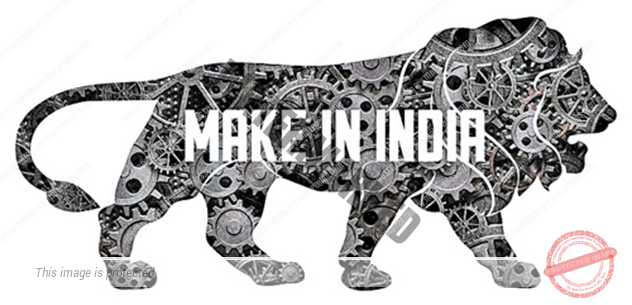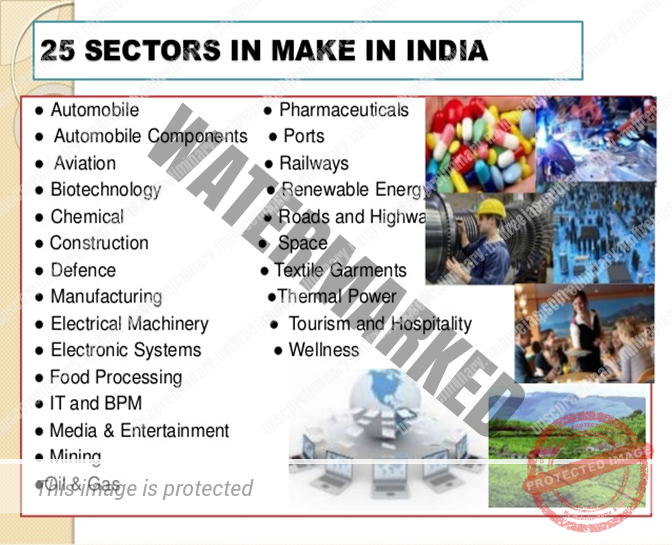- MAKE IN INDIA
- EASE OF DOING BUSINESS
- INDUSTRIAL CORRIDORS
UNIT 9 & 10 – INDUSTRY AND INFRASTRUCTURE – PART 15
Major policy initiatives for Indian Industry sector
Make in India
This landmark initiative was launched in 2014 which was devised to transform India into a global design and manufacturing hub. It aimed at raising the contribution of the manufacturing sector to 25% of the GDP by 2020. It represents a comprehensive and unprecedented overhaul of outdated processes and policies. Most importantly, it represents a complete change of the government’s mind-set – a shift from issuing authority to business partner, in keeping with Prime Minister’s tenet of ‘Minimum Government, Maximum Governance’.
- a) Inspire confidence in India’s capabilities amongst potential partners abroad, the Indian business community and citizens at large.
(b) Provide a framework for a vast amount of technical information on 25 industry sectors: and
(c) Reach out to a vast local and global audience via social media and constantly keep them updated about opportunities, reforms, etc.
- The Department for Promotion of Industry and Internal Trade (DPIIT) is the nodal agency for the initiative.
- Drive investment, fostering innovation, developing skills, protecting Intellectual Property (IP) and building best-in-class manufacturing infrastructure.
- The most striking indicator of progress is the unprecedented opening of key sectors – including railways, defence, insurance and medical devices – to substantially higher levels of Foreign Direct Investment.
- The ministry has engaged with the World Bank group to identify areas of improvement in line with World Bank’s ‘doing business’ methodology. Several workshops with Ministries and State governments have been conducted by the Department for Promotion of Industry & Internal Trade (DPIIT) and World Bank for Business Reforms Action Plan.
- An Investor Facilitation Cell (IFC) dedicated for the Make in India campaign was formed in September 2014 with an objective to assist investors in seeking regulatory approvals, hand-holding services through the pre-investment phase, execution and after-care support.
- The Indian embassies and consulates proactively disseminate information on the potential for investment in the identified sectors.
- DPIIT has set up a special management team to facilitate and fast track investment proposals from Japan. The team known as ‘Japan Plus’ was operationalized in October 2014. Similarly, ‘Korea Plus’, launched in June 2016
- Various sectors have been opened-up for FDI like defence manufacturing, railways, space, single brand retail, etc. Also, for ease of doing business, the regulatory policies have been relaxed to facilitate more investments.
- Across various regions of the country; six industrial corridors are being developed. Industrial Cities will also come up along these corridors.
Ease of Doing business
‘Ease of doing businesses refers to the regulatory environment in a country to set up and operate a business. Every year, the World Bank compares the business environment in 190 countries in its Ease of Doing Business Report.
The ease of doing business rankings is based on a country’s performance on 10 parameters. In India, these rankings are based on the business environment in Mumbai and Delhi.
A lower rank indicates better performance on that parameter, whereas a higher rank indicates worse performance on the indicator.
The report measures the performance of countries across 10 different parameters namely-
- Starting a Business,
- Dealing with Construction permits,
- Electricity availability,
- Property registration,
- Credit availability,
- Protecting minority Investors,
- Paying Taxes,
- Trading across borders,
- Contracts enforcement, and
- Resolving Insolvency.
India was placed at 63rd position this time (2019) out of 190 countries marking an improvement of 14 places from its 77th position in 2018.
India’s score improved from 67.23 in the previous year to 71.0 this year.
India for the third consecutive year was present in the list of 10 economies where the business climate has improved the most.
India’s ranking improved basically on four parameters:
- Starting a Business
- Dealing with Construction Permits
- Trading across Borders
- Resolving Insolvency
Industrial corridors
Delhi Mumbai Industrial Corridor (DMIC) project was approved by Union Cabinet of India in 2007. Later, the institutional and financial structure of the project was approved by the Government of India are the Scheme was launched in September 2011. Further, NICDIT (National Industrial Corridor Development and Implementation Trust) under this Department was approved on 07/12/2016 for the expansion of the scope of existing DMIC-Project
- Delhi Mumbai Industrial Corridor (DMIC)
- Chennai Bengaluru Industrial Corridor (CBIC)
- Amritsar Kolkata Industrial Corridor (AKIC)
- East Coast Economic Corridor with phase-1 as Vizag- Chennai Industrial Corridor (VCIC)
- East Coast Economic Corridor with phase-1 as Vizag- Chennai Industrial Corridor (VCIC)
- Hyderabad Warangal and Hyderabad Nagpur Industrial Corridor
- Hyderabad Bengaluru Industrial Corridor (HBIC)


